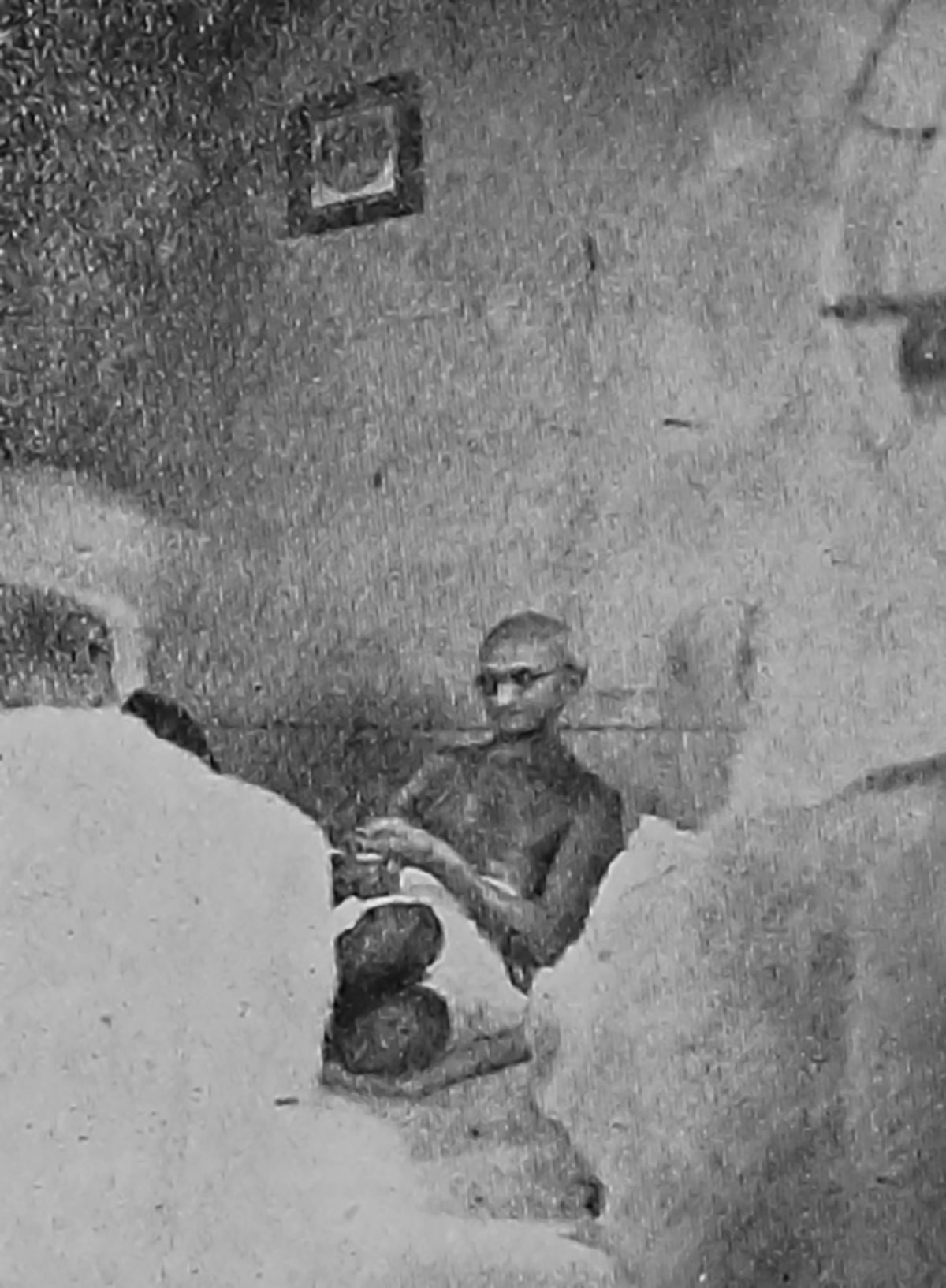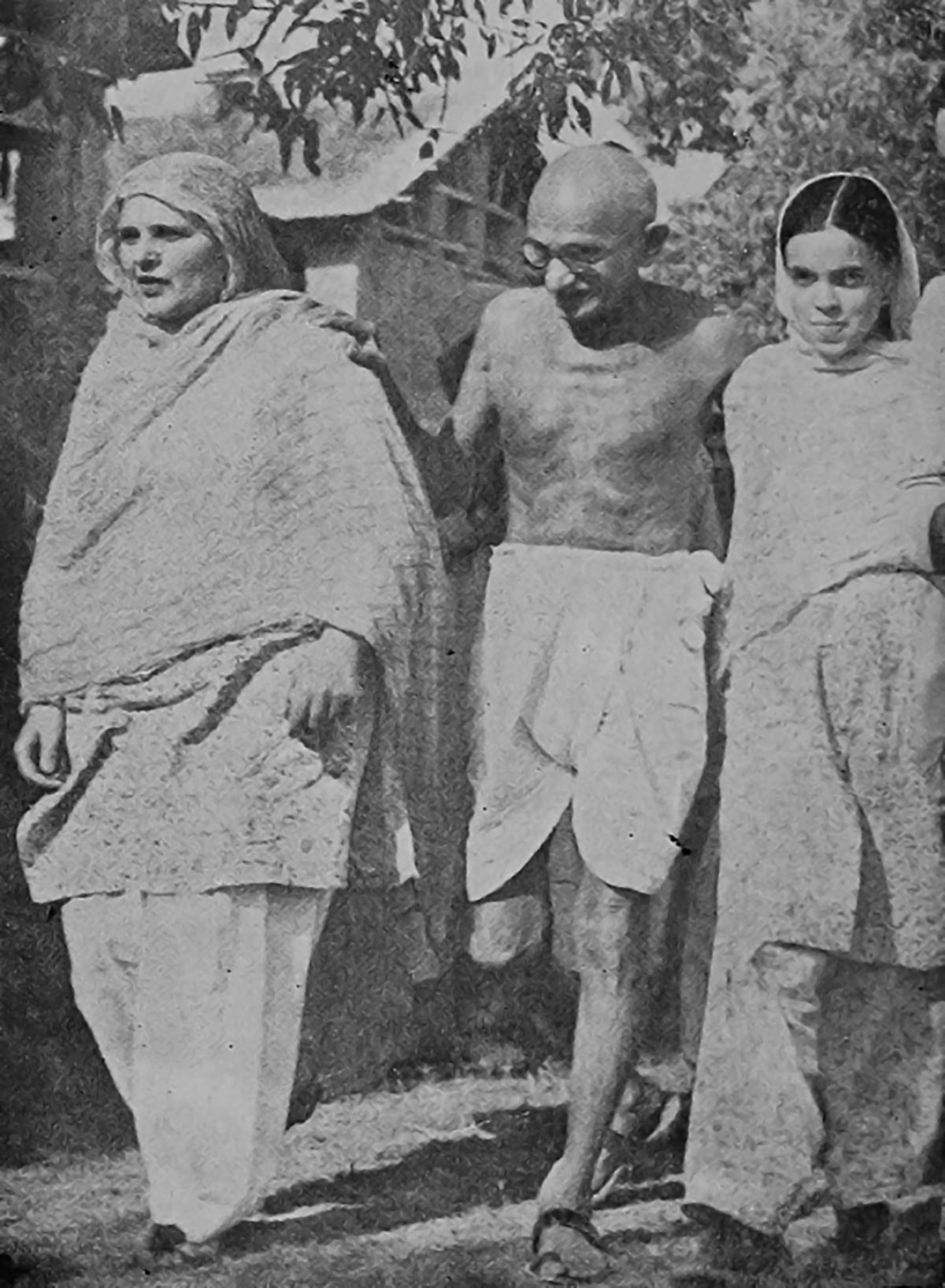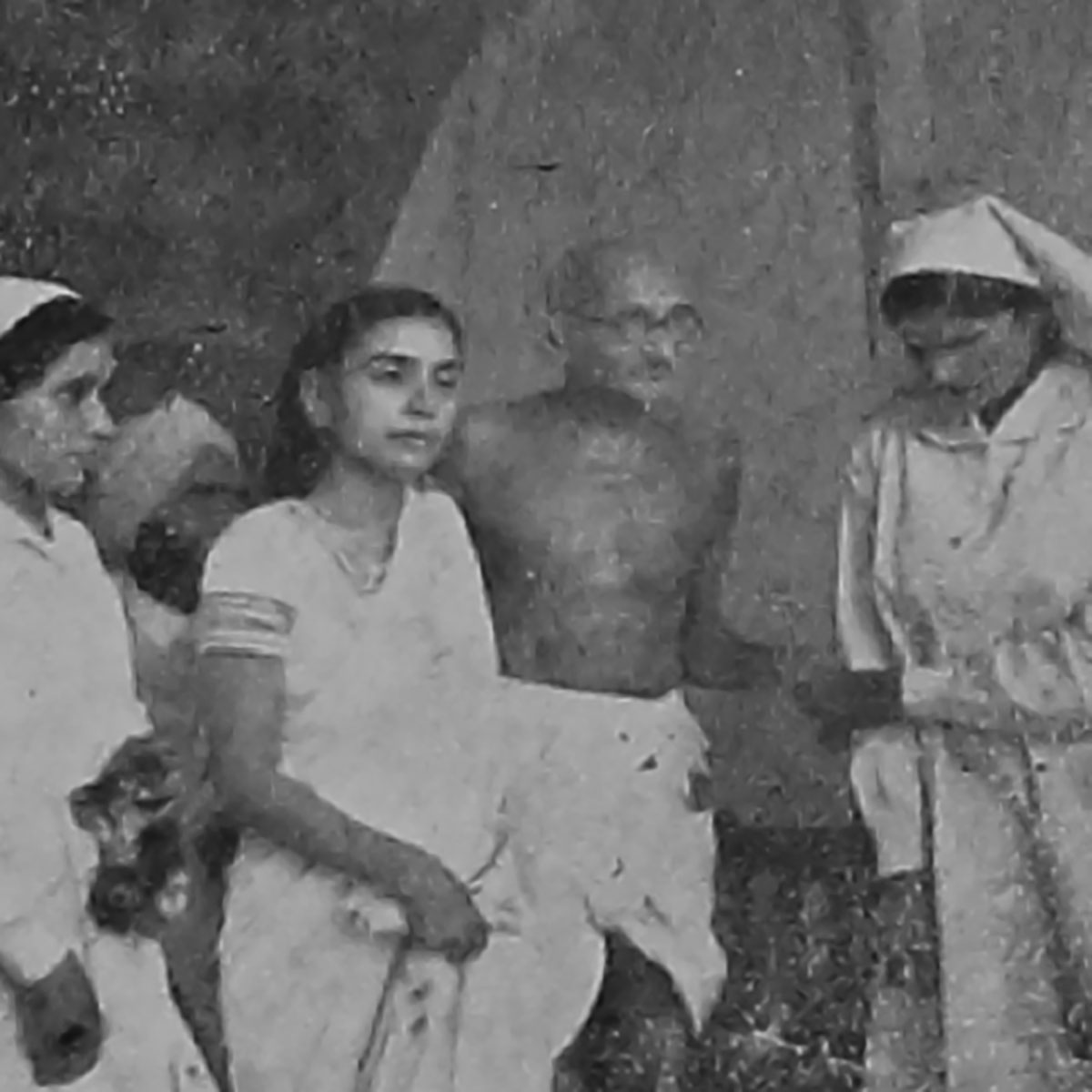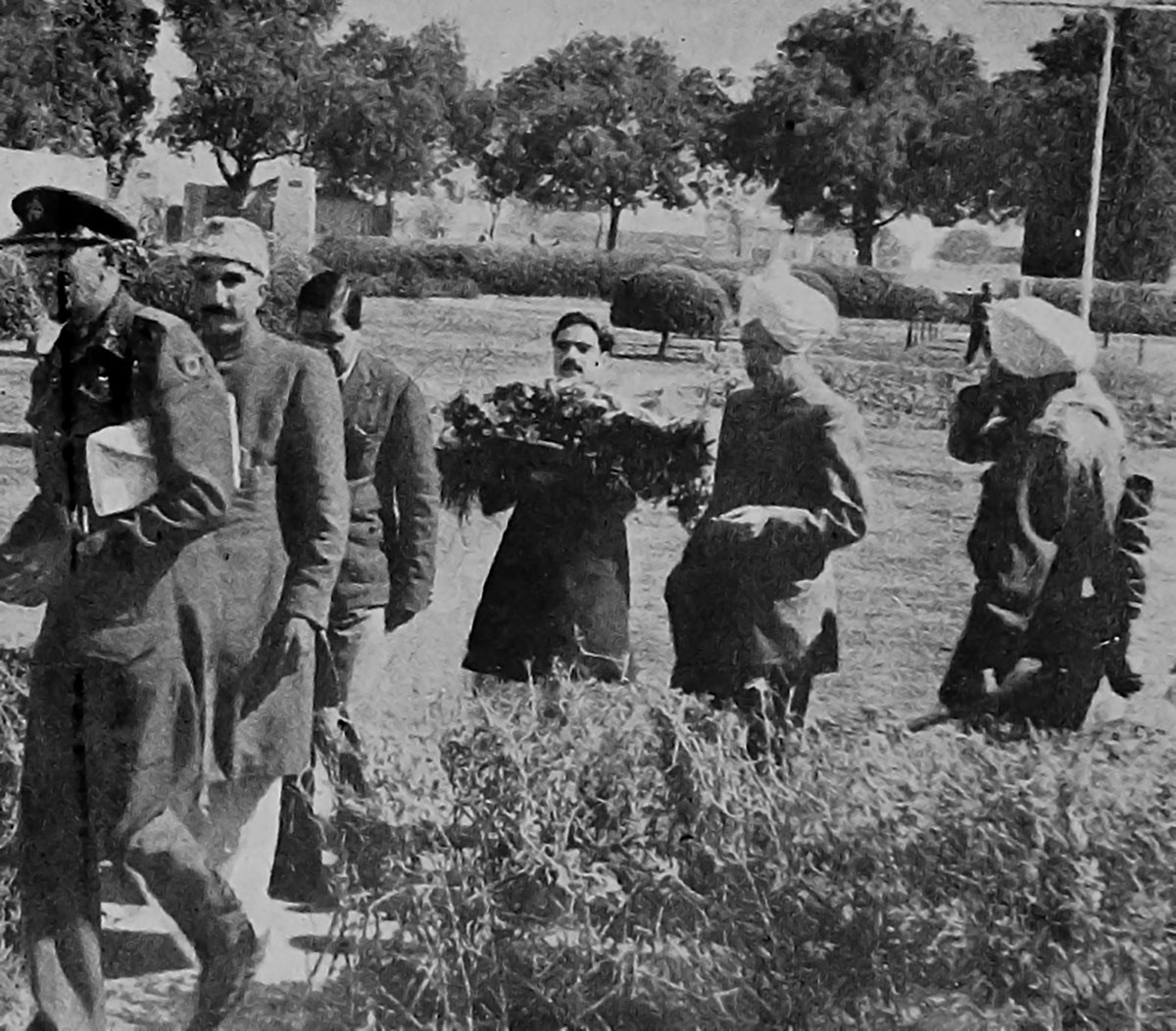In order to imagine how Mahatma Gandhi would have responded to Kashmir’s present situation, it is important to understand Gandhi’s long Kashmir story first on his 150th birth anniversary

Gandhi in Mujahid Manzil, Srinagar Begum Abdullah is also there.
How M K Gandhi would have responded to a situation in which Kashmir landed after August 5? The man who led the freedom movement in India with emphasis on non-violence has, to his credit, some of the historic statements on Kashmir, minorities and the communalism. He actually found the “ray of hope” only in Kashmir at the peak of communal massacres before and after the partition of India in 1947.
“What can be the meaning of communalism in a state which is overwhelmingly one population according to religion? What can communalism mean in, say, Kashmir or the Frontier where the population is predominantly of one faith?” Gandhi wrote in Harijan on September 17, 1938. “The doctrine of minority is a good hobby to ride up to a point. But it must be at least numerically a fair minority. Even a minority of one can expect perfect justice.”
How could Gandhi reconcile with the current situation in Kashmir in the backdrop of his statement on April 19, 1942: “If Kerala and Kashmir were speaking the same language, I would treat them as two distinct provinces.”
“Is Kashmir a Hindu State because a Hindu Prince happens to rule a territory which has an overwhelming majority of Muslims as its inhabitants? Or is Hyderabad with its overwhelming Hindu population a Muslim State because a Muslim Prince rules their destiny?” Gandhi wrote in Harijan on February 18, 1939. “I regard this kind of talk as a libel on nationalism.”
But to understand Gandhi’s Kashmir story, one must get into the details of his association with Kashmir. He knew Kashmir for a long time but visited only once and that too reluctantly. That visit was hugely consequential. Recorded by the historians, his involvement with Kashmir can be chronologically traced from 1931.
Kashmir Woollens
The first reference linking Ghandi and Kashmir involves the Kashmiri woollens. “Fine woollen things come only from Kashmir, and so it has become the fashion nowadays to palm off foreign woollens as cashmere, i.e., fabrics hand-spun and hand-woven in Kashmir,” Sjt Kotak, who handled the All India Spinners Association (AISA) in Srinagar, wrote in Gandhi’s Young India (May 7, 1931), and Navajivan (May 3, 1931), at the peak of the Swadeshi and Khadi movement. “Can you not do anything to stop this fraud?”
Though there has been an exchange of letters between Prem Nath Bazaz and Ghandi, for many years, Srinagar’s Khadi Bhandar was Ghandi’s main Kashmir connection. By 1935, he was seeking suggestions to address the “complaints about the management of the Kashmir branch” and a year later, he wrote someone: “The only person I know in Kashmir is Shri Surendra Mashruwala of the Khadi Bhandar.”

M-K-Gandhi-during-his-only-visit-to-Kashmir.-In-this-July-1947-photograph-in-Srinagar, he is seen walking with Begum Akbar Jehan, wife of Sheikh Abdullah, and Khalida, her daughter.
Gandhi was, for a long time, fascinated by the woollens produced in Kashmir. “It is the khadi spirit which has enabled Kashmir woollens and Bengal-Assam silks to hold their own,” he wrote in Harijan (November 7, 1936). Seemingly, he was keen to improve the Kashmir product. On June 21, 1937, he wrote to Purushottam K Jeranjani about the blanket he had earlier sent him. “The blanket that I have sent you is a hand-woven one from Scotland. It is said that even the wool is hand spun. The beauty of it lies in the composition of different colours. The purpose in sending it to you is that you may try and make use of the design in Kashmir or some other place.”
By 1945, he was discussing with the managers of the Bhandar in Kashmir to lift a bank loan for the better management of the depot.
Till his last breath, he remained a strong votary against the mechanical interventions in handicrafts. “For instance, the woollen manufactures in Kashmir are not self-use. They cater for the market for fancy goods outside Kashmir. They are extremely popular,” Gandhi was quoted telling a friend somewhere on August 17, 1946. “Now, if we introduce machine carding, they can hold their own against all competition. But that would be against the fundamental khadi principles.”
For Sheikh Abdullah
Gandhi’s close circuit was literally pushing him for a Kashmir visit since 1933. “You swear by Kashmir, but let me tell you that it is not the climate that suits every constitution and in any case I cannot go to Kashmir in search of health,” Gandhi wrote to a well-wisher on June 20, 1933. “I must find my health where my work lies.”
By June 1939, he was willing to an extent: “I am not going to Kashmir unless JL (Nehru) comes and takes me there.” Finally he was supposed to be in Kashmir by July 23. He actually wrote to his friends to join him in Srinagar for a week.
Barely five days ahead of the visit, he conveyed to Amrit Kaur from Abbottabad: “I am sorry to have to tell you that I had to withdraw acceptance of state hospitality in Kashmir. The people won’t tolerate any such thing. This is unfortunate. But I did not want to create bitterness.”
“I regret to say that for unavoidable reasons I have been obliged to cancel my Kashmir visit,” The Hindu carried his statement from Abbottabad on July 22, 1939. “I must apologize to those who were led to expect my visit to India’s fairyland.”

Gandhi visiting National Hospital in Srinagar. Dr Sushila Nair is conducting him.
“After all I could not go to Kashmir. Sheikh Abdullah and his friends won’t tolerate the idea of my being State guest. Banking on my past experience, I had accepted State offer in anticipation of Sheikh Abdullah’s approval. But I saw that I was mistaken. I therefore cancelled the acceptance of the State hospitality and accepted the Sheikh’s. This embarrassed the State. So I cancelled the visit altogether,” Gandhi wrote to Nehru on July 29. “I was guilty of double stupidity – in daring to think of going there without you and in not getting Sheikh’s permission before accepting the State offer. I had thought that I would serve the people by accepting the State offer. I must confess that I was not pleased with my contact [with]the Sheikh and his friends. They seemed to all of us to be most unreasonable. Khan Saheb reasoned with them. But it was to no purpose.”
The cancellation remained on his mind for a long time. On July 24, 1941, he wrote a detailed letter to Sheikh Abdullah: “You have my apology. You had, I thought, always told me that you were a soldier and I was your General. I see I misunderstood you. I now understand your complaint about Kashmir. I asked Badshah Khan who is with me and he supports me. He vividly recollects the grief he in common with me felt over your obstinacy in opposing my wish to be the state guest not for my pleasure but for the sake of the people of Kashmir. You should know that I cancelled the visit to Kashmir simply to please you. I changed overnight for I learnt that if I came as the people’s guest the Durbar would take it amiss. I thought that I could take the liberty I took with my followers as I deemed you to be in altering my plans. But now I see that you were only trying me before becoming my follower. I am sorry I failed in your test.”
In various subsequent letters, Gandhi would tell Sheikh that Mridulabehn (Mirdula Sarabhai) is keeping him informed about his activities and the developments taking place in Kashmir.
Panic In Congress
In the 1946 summer when Maharaja Hari Singh arrested Sheikh Abdullah over the Quit Kashmir Movement, Nehru came to manage his legal defence. He defied Maharaja’s no-entry orders and was arrested and kept in the Kohala Dak Bungalow. Gandhi was perturbed over the development. “The Committee is also solicitous equally with you about Sheikh Abdullah’s case and the welfare of the Kashmir people,” Gandhi wrote to him. “Therefore I expect you to return in answer to this. You will tell Maharaja Saheb that as soon as you are freed by the Congress you will return to Kashmir to retrieve your honour and fulfil your mission.”
Apart from speaking about the arrest and Nehru’s importance at a number of prayers meetings, Gandhi actually asked Moulana Azad to summon him back. Even the Viceroy was requested to use the Resident’s good offices in Srinagar to send Nehru back.
Maharaja had made a fierce speech on July 15, 1946 saying the Kashmir Government would resist any outside interference in their internal affairs fully realizing that such a course would lead to strife, disorder and bloodshed among the people of Kashmir. When Sardar Vallabh Bhai Patel sent the text of the speech to Gandhi, he partly shared his tensions.
“It may also be that the Kashmir affair will be used to sabotage the whole thing. I feel that we should not let such a possibility arise,” Gandhi wrote to Patel on July 17, listing the possibilities of interventions. “If in spite of all that we do the whole thing collapses it cannot be helped. The situation requires very careful consideration. Munshi will tell you the rest.”
On July 17, he wrote to Nehru: “In regard to Kashmir, Sardar has sent me the Maharaja’s speech. It deserves careful study. I think a meeting of the Working Committee should be called to consider it. Let us not be hasty. Let us not endanger the whole thing just for this reason. I am of the view that Maulana Saheb and, if necessary, Sardar too, should go to Kashmir. After all, has not the Working Committee assumed the entire responsibility?”
Congress stand toughened on Kashmir. On September 25, 1946, Congress Working Committee adopted a resolution. Its resolution condemned the ‘repression of a subtle type’, and fake reforms. “The WC therefore earnestly recommend to the Kashmir State they should invite the Congress to send a deputation of reputable men of unquestioned ability and impartiality to find whether there is repression of liberty in Kashmir, whether there is tampering with the voters and whether reforms promised are substantial enough to secure contentment and prosperity of the people of the State,” it said.
Gandhi started asserting on Kashmir. “Goa is as much a part of India as Kashmir or any other State,” he told a prayer meeting on October 2, 1946. “Today it is the country which is being divided, tomorrow it may be Kashmir and the day after it may be the State of Junagadh in the remote corner of Kathiawar,” Gandhi told Sir M Derling on April 8, 1947. He told a prayer meeting on May 31, 1947: “…If anyone says that because the Nawab of Bhopal is a Muslim, Bhopal would be a Muslim territory and that in Kashmir a handful of Brahmin would wield power, this will not be conceded at all.”
Kashmir Concern Mounts
By summer 1947, Gandhi publicly desired to visit Kashmir. “Today also Jawaharlal’s mind is in Kashmir, where Sheikh Abdullah, the leader of the people, is locked behind the bars. I told Jawaharlal that he was needed more here,” Gandhi told the June 1, 1947 prayer meeting in Delhi. “I told him that if it was necessary I would go to Kashmir and do his work and that he should stay here…I could still go to Kashmir because there too the problem of the Muslims was involved. I would go there and befriend the Maharaja of Kashmir and work for the good of the Muslims.”
On June 7, he again said: “As against this (Oudh), the State of Kashmir, although it is worth millions, will be wiped out if it does not listen to the voice of its people. Hitherto these rulers may have behaved arrogantly with the support of the British authorities; but now they must realize that their authority issues from the people. I made a special mention of Kashmir because at the moment our eyes are fixed on it.” He added on June 24: “If Travancore becomes independent then Hyderabad, Kashmir, Indore and other States will also declare themselves independent and India will be Balkanized.”
Keen To Visit Kashmir
Unlike 1933, Gandhi was keen to reach Kashmir. He actually sent an urgent communication to Lord Mountbatten asking him to write to Maharaja for his visit. “I might have to go to Kashmir almost immediately,” he wrote to Mirdula on June 29. An obliging Governor General was quick to write to Maharaja.
“Mr Gandhi tells me that Pandit Nehru is prepared to forgo his visit if he (Mr Gandhi) goes instead,” Mountbatten wrote to Maharaja on June 26. “..He has given me his firm assurance that he will make no political speeches or carry out any form of propaganda. The object of his visit would be to see Madame Abdullah; and, if you granted permission, he would like to see Sheikh Abdullah. He would like to meet the people in general way, but has no desire to address them or to collect large crowds.”
By July 11, he wrote another letter to Mountbatten asking him to remind the Maharaja. “If I was not bound by any promise made to you, of course I would not want any permission to go to Kashmir,” Gandhi wrote. “I would simply go as any private person.” Five days later, he sent him another letter. “He (Nehru) is firmly of opinion that I should go in any case, not minding if Qaid-e-Azam Jinnah or his deputy goes after my visit. He thinks, and I agree, that if now my visit is postponed, it will disappoint many persons in Kashmir.” He reiterated: “..I suggest that you should telegraph to the Maharaja Saheb that as my visit would not mean any speeches or public meetings, it should not cause any embarrassment to the State and that I should go to Kashmir at the earliest possible moment.” Two days later, on July 17, Gandhi writes to Pyare Lal saying the “Kashmir problem is threatening to become serious.”
Abruptly, however, Gandhi put brakes on his visit on July 19, 1947 when he wrote to Mountbatten: “…my going to Kashmir should be postponed till after Pandit Kak’s arrival in New Delhi. So I shall await Pandit Kak’s arrival and further developments.”
In the records of the subsequent days, the insistence on his Kashmir visit continues but there is no detail about Ram Chand Kak’s visit. However, Kak had written to Viceroy that though the Kashmir government was unwilling to host a politician but Gandhi Ji could come and not Nehru. Kak was Kashmir’s Prime Minister and Maharaja disliked him most. Even Congress strongly believed that Kak’s presence in Kashmir would take the Valley away so they helped Maharaja in getting Mehr Chand Mahajan, as his replacement.
While Gandhi was keen to visit Kashmir, he was, at the same time feeling that he should not go. “The more I think of it the more I am convinced that I should leave here as soon as the Kashmir affair is settled. I do not like much of what is going on,” he wrote to Sardar Patel on July 24. “I do not say that for that reason it should be changed; but only that I should not be said to be associated with it.” He wrote him again on July 28, 1947: “I have already written to you – haven’t I – that I do not wish to go to Kashmir and that Jawaharlal will go instead. Now I have a letter from the Viceroy saying I may go but not Jawaharlal. I therefore cannot make up my mind. What shall I do?”
“I am told I should go to Kashmir. I am not particularly desirous of going there nor should I be,” he told a prayer meeting on July 29. He explained his earlier plans of visiting Kashmiri that failed. “And now the situation is such that either Jawaharlal or I should go to Kashmir. He cannot go…. If the head of the Interim Government makes a journey to Kashmir, it can be interpreted as an attempt on his part to make Kashmir accede to India. Therefore, it seems that it would be better for me to go.”
Gandhi told the audience that his intention is not to suggest the Maharaja to accede to India and not to Pakistan. He did not want the Maharaja should be inconvenienced. “The pundits and mullahs in Kashmir know me at least by name. I have given a lot of money to Kashmiris. In Kashmir, shawl-making, embroidery, etc., are well developed handicrafts. The charkha also has done good work there. The poor people of Kashmir know me,” Gandhi said. “The people of Kashmir should be asked whether they want to join Pakistan or India. Let them do as they want. The ruler is nothing. The people are everything.”
Gandhi finally left for Kashmir from Lahore on July 31, 1947.
His Only Visit
On the eve of his Kashmir visit, Gandhi wrote a friend: “I am going to Kashmir. I am going only in order to see for myself the condition of the people. In any case I shall have a glimpse of the Himalayas. Who knows if I am going there for the first and the last time?”
After spending three days in Kashmir, Gandhi revealed details of his Kashmir visit at a prayer meeting at Wah on August 5, 1947 that were reported by Harijan on August 24. Without holding any public meeting, Gandhi met Begum Akbar Jehan, Maharaja, Maharani and Kak. Asserting that the Treaty of Amritsar will end on August 15 and Kashmir will be independent but it will eventually have to choose between the two dominions.
“He held that without going into the intricacies of law which he had no right to dilate upon, common sense dictated that the will of the Kashmiris should decide the fate of Kashmir and Jammu. The sooner it was done the better,” the newspaper quoted him saying. “He hoped that the question would be decided between the two Dominions, the Maharaja Saheb and the Kashmiris. If the four could come to a joint decision, much trouble would be avoided. After all Kashmir was a big State; it had the greatest strategic value, perhaps in all India.”
In the visit related note, Gandhi recorded on August 6, he quoted Bakhshi Ghulam Mohammad saying that in a free vote, Kashmir will join the union if “Sheikh Abdullah and his co-prisoners were released, all bans were removed and the present Prime Minister was not in power.” He wrote to Sardar the same day: “In my opinion the situation in Kashmir can be saved.” The conditions were to help Maharaja get rid of Kak, the man with “the sweet tongue”.
The Raids And Prayers
Kashmir resurfaced in Gandhi’s routine prayer meeting in Delhi in October when the tribal fighters had literally sliced the state.

Gandhi’s mortar remains being taken to Kashmir by the then Deputy Prime Minister Bakshi Ghulam Mohammad, a photograph taken at the Delhi airport.
“If the people of Kashmir are in favour of opting for Pakistan, no power on earth can stop them from doing so. But they should be left free to decide for themselves. The people cannot be attacked and forced by burning their villages,” Gandhi told the prayer meeting on October 26, the same day when Maharaja fled Kashmir. “If the people of Kashmir, in spite of its Muslim majority, wish to accede to India no one can stop them.” Since the British have left, the people will decide their future. He said nobody should be coerced: “The Pakistan Government should stop its people if they are going there to force the people of Kashmir. If it fails to do that, it will have to shoulder to entire blame.”
The next day, he talked about Kashmir again, Delhi had accepted the accession offer of Maharaja and the army was flying to Srinagar. It was in this prayer meeting, he famous said: “I shall dance with joy even if everybody in Kashmir has to die in defending his land. There would be no sorrow in my heart.”
In his speech, Gandhi detailed the tribal interventions and the response. He talked about Sheikh and his Begum who had recited Aauz-u-Billahi to him in her melodious voice in Srinagar. He said the “poison” that has spread will be removed by the sacrifices in Kashmir.
For a long time, Kashmir would dominate Gandhi’s prayer meetings.
Post War
Gandhi asserted that there was no option but to take Kashmir to UN. He, however, would prefer a bilateral settlement. On January 4, 1948, barely a month before he was assassinated, Gandhi said: “Mistakes were made on both sides. Of this I have no doubt. But this does not mean that we should persist in those mistakes, for then in the end we shall only destroy ourselves in a war and the whole of the subcontinent will pass into the hands of some third power. That will be the worst imaginable fate for us. I shudder to think of it.”
from Kashmir Life https://ift.tt/2p0lRO0
via IFTTThttps://kashmirlife.net
No comments:
Post a Comment